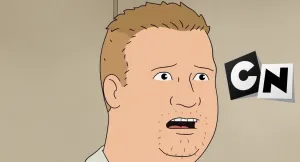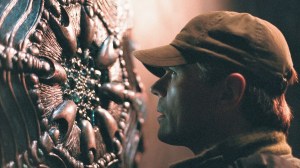Steven Soderbergh, one of the most celebrated directors and producers of the last twenty years, flew in for two days to shoot second unit (“B team”) coverage on Gary Ross’s The Hunger Games.While Ross is a fine director and his stock has undoubtedly gone up considerably with the monumental success of The Hunger Games, just saying out loud that the director of Traffic, Ocean’s Eleven and Erin Brockovich took time out between filming Magic Mike, Haywire and Contagion to go do second unit work for Ross is a bizarre thing to consider, really.So how did it happen? Collider got to the bottom of it. Here’s the explanation:
Videos by ComicBook.com
Well, Gary’s a friend of mine; I’ve known him a long time. At one point, actually, in the mid-90s I was crashing on his couch for three weeks. We just have a history of helping each other out on stuff, I show him everything, I was a producer on Pleasantville. So we just have a long history of kind of doing each other solids when one of us needs help. So he called me in April and said, “I’m looking at the board of Hunger Games and I’ve got these two days of second unit at the end of August, what are you doing? Can you come down? I’ve got to get somebody I trust to do this, would you be interested?” So I said, “Yeah, actually Contagion will be done and we won’t have started Magic Mike, it’s actually perfect. I can literally just fly in and do it.”What I found really nerve-wracking about it was shooting and really worrying, “Am I getting what he needs? Am I getting what he wants?” When I’m shooting my own stuff I look at it and I go, “OK, I’ve got it, I need this, I got that.” Here he’s off with the first unit, I’m here, I want to deliver for my friend what he needs. I found that aspect of it- I was very anxious that I was getting everything that he needed and wanted. The fun part of it was my job there was to recreate exactly the aesthetic that he and Tom Stern have set up in terms of framing, and lighting, and movement. I’m there to be a chameleon and duplicate that so that it’s seamless. And I love that, I love kind of submitting to that and following their rules. So we went down, we shot a ton of s–t, it was really fun and then I didn’t hear from him and I’m like, “Oh, no.” Finally two weeks later he emailed me and he goes, “I just realized I don’t think I ever responded.” He goes, “I’m so happy with the stuff. Thank you.” And I went, “Oh God, dude, you had me completely flipped out, I thought I was going to read that you had to redo it.” He’s like, “No, no, no it all worked out great.” So it was fun, it was a tough show. I was really happy that the movie took off because he worked really hard on it. It was a tough show. I totally understood him feeling like “I don’t want to go back and do that again”, because I would have felt the same.
Another relationship that Soderbergh has, which goes back for years, is The Dark Knight director Christopher Nolan. In that same interview, Soderbergh talks about working with a number of filmmakers, one of whom is Nolan, who he and George Clooney (apparently he didn’t know his Batman would be retconned as a result–or maybe that was the game plan)–had to sell to Warner Bros. to work on Insomnia, Nolan’s first of many films with the studio.”It depends on the filmmaker, depends on the scale of the movie, I’m sort of keying off what I think people need from me,” Soderbergh said when asked what his role generally is as a producer. “In the case of Insomnia, he doesn’t need me around, I went to the set one day, literally, just to say hello to everyone and then flew back home. All Chris [Nolan] needed was to get in the f—ing door, that was the problem was that the head of the studio at that point didn’t understand why George [Clooney] and I were so lit up about him and I had to go in and go, ‘You need to give this guy this job. This is good for you.’ Once that happened, once he was on, it was literally, ‘I’ll see you when you’re done.’ He doesn’t need help like that. Other people want you to watch everything, it just depends.”









